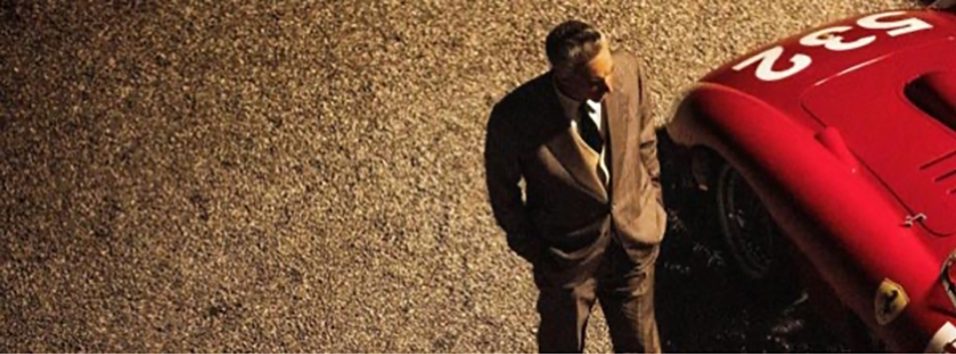“Ferrari” is the latest example of Hollywood’s love of brands


This article was originally published by The Economist on 1 February, 2024.
Michael Mann’s luscious but limited “Ferrari” is a fitting film to end 2023, a year dominated by brand movies (“Barbie”, above all) and biopics (“Oppenheimer”, “Napoleon”, “Maestro”). “Ferrari” is a combination: a “brand biopic”. The movie, released in America on Christmas Day and in Britain the day after, follows the sports-car firm’s founder, Enzo Ferrari (played by the aptly named Adam Driver), as he grapples with the dual disarray of his company and his personal life.
The year is 1957. Ferrari’s beloved son, Dino, has died of muscular dystrophy; his long-chilled marriage (and business partnership) with Laura (Penélope Cruz) has been driven to the verge of collapse by her discovery of his long-time lover; and the company faces bankruptcy, plus humiliation at the hands of an ascendant Maserati. Its drivers have to win the Mille Miglia race across Italy in order to sell more cars. If they fail, the firm will go under.
You know Enzo’s type: the flawed genius, the purist in the face of change. He sells cars to win races, not the other way around. But that is not the way the wind is blowing. “The game is changing, Enzo,” the boss of Maserati says, in one of the film’s many flimsy lines. tv would bring mass audiences, and bigger markets. The age of the small carmaker would soon end. (In 1969, Fiat, now part of a group whose biggest shareholder part-owns The Economist’s parent company, bought 50% of Ferrari, a stake later raised to 90%.)
Add the mid-century Italian decor, and this drama makes an engaging and stylish side-dish to the meat of the movie: handsome men driving handsome cars. The engines’ snarls and roars alone are worth the price of admission. You can even forgive Mr Driver’s absurd Italian accent, which makes him sound, at best, like an Israeli pretending to be Russian.
Films are one of the few cultural products whose earnings are commonly discussed, even celebrated. But increasingly business is in front of the camera, too, in the form of what you might call “merchandise movies”, like the year’s two highest-grossing titles worldwide, Mattel’s “Barbie” and Nintendo’s “The Super Mario Bros. Movie”, and other “brand biopics”, like “Air” (about a Nike training shoe), “Flamin’ Hot” (Cheetos), the excellent Canadian film “Blackberry” (a smartphone), “Tetris” (a classic video game) and now “Ferrari”.
These are films in which the heroes (and sometimes villains) are the inventors and businesspeople who have made the modern world—or the consumer products they created. (It is perhaps not a coincidence that Mr Mann, like Sir Ridley Scott, started out as a director of commercials.)
Audiences have long been used to product placement. As early as 1896 the Lumière brothers used Lever Brothers soap in “Washing Day in Switzerland.” But the brand biopic is more like product replacement—films not as vehicles for selling brands, but brands as vehicles for selling films (some of them even about vehicles, or, like this year’s video-game spinoff “Gran Turismo”, virtual vehicles).
That is not to say films about brands are bad films. “Barbie” was an aesthetic delight. “Ferrari” is a pleasing blend of family drama and car porn. Some brands have become so embedded in the collective imagination as to deserve dramatic reimagination; and business, with its mix of risk, ingenuity, competition and charisma, is fertile ground for film. Just think of “The Social Network”, released in 2010, an early example of the genre, or the movies (“The Wolf of Wall Street”, “The Big Short”) that helped establish finance as a topic worthy of Hollywood.
Even so, it is hard not to see the increasing focus on familiar brands, like that on familiar franchises, as another instance of the film business’s aversion to risk. Like superhero series, brand biopics bring in a ready-made audience of consumers and fans, making them a safe-ish financial bet for studios. It is striking that so many titles are names that audiences already know. “Ferrari” rounds out a year in which all but two of the top 15 grossing American-made films were sequels, remakes, tie-ins, or spinoffs.
2024 will bring more of the same. In 2024 filmgoers are promised a spate of prequels and sequels (“Dune: Part Two”, “Gladiator 2”, “Kingdom of the Planet of the Apes”, a new King Kong film, a new Joker movie, Mad Max and Transformers prequels, a new Lord of the Rings movie); remakes (“Mean Girls”, “Ghostbusters”, “Twisters”, “Beetlejuice 2”), spinoffs (“The Garfield Movie”, a female Spiderman flick, a female John Wick movie), at least two Mattel films (“Barney”, “Masters of the Universe”) and a bevy of biopics (of Bob Marley, Michael Jackson, Amy Winehouse, the band Kiss). As any brand developer will tell you, innovation is risky business.
The articles may contain material provided by third parties derived from sources believed to be accurate at its issue date. While such material is published with necessary permission, the Westpac Group accepts no responsibility for the accuracy or completeness of, nor does it endorse any such third-party material. To the maximum extent permitted by law, we intend by this notice to exclude liability for third-party material. Further, the information provided does not take into account your personal objectives, financial situation or needs and so you should consider its appropriateness, having regard to your personal objectives, financial situation and needs before acting on it.